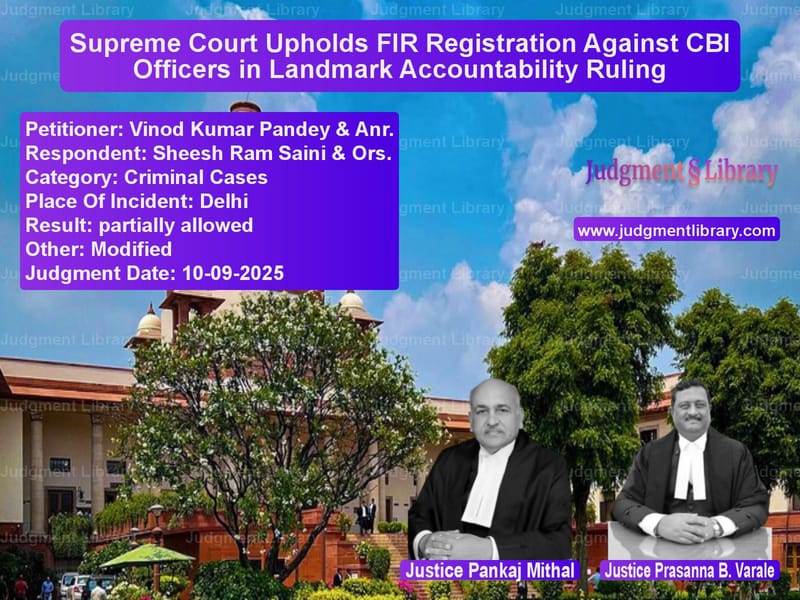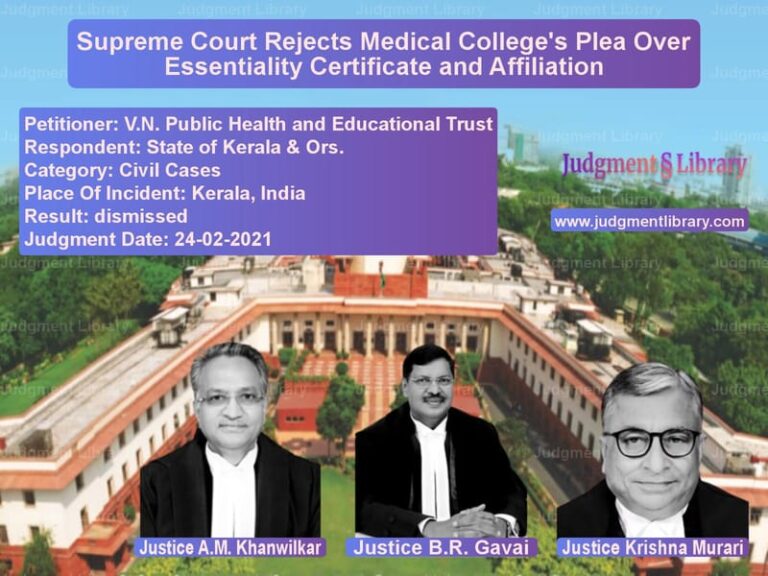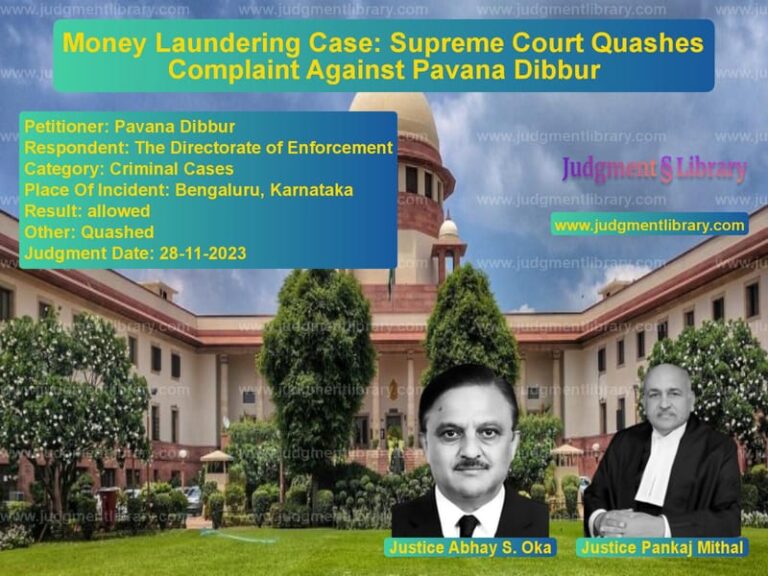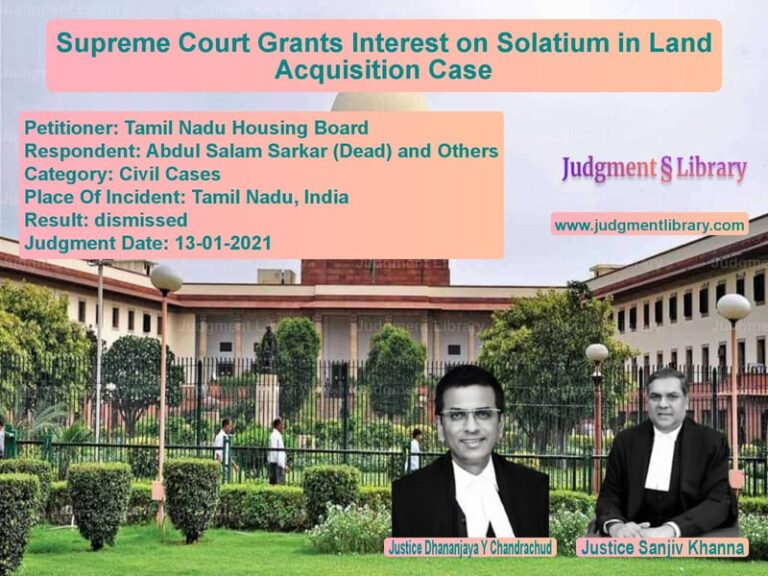Supreme Court Upholds FIR Registration Against CBI Officers in Landmark Accountability Ruling
In a significant judgment that reinforces the principle that investigators must also be accountable to the law, the Supreme Court of India recently delivered a landmark ruling upholding the registration of FIRs against two senior CBI officers. The case, which had been pending for over two decades, involved serious allegations of abuse of power, document forgery, and intimidation by officers who were supposed to uphold the law.
The legal saga began in the early 2000s when two individuals, Sheesh Ram Saini and Vijay Aggarwal, filed separate writ petitions before the Delhi High Court seeking directions for registration of FIRs against CBI officers Vinod Kumar Pandey (then Inspector) and Neeraj Kumar (then Joint Director). The petitioners alleged that the officers had committed various offences including criminal intimidation, wrongful confinement, forgery, and criminal conspiracy under sections of the Indian Penal Code.
The allegations against the CBI officers were serious and detailed. Sheesh Ram Saini complained that documents were seized from him on April 26, 2000, without preparation of a seizure memo, which was only prepared the next day on April 27, 2000. This procedural violation, according to the complainant, was not merely an irregularity but attracted penal provisions for preparing false records. Vijay Aggarwal’s complaint was even more grave – he alleged that Vinod Kumar Pandey had summoned him on June 7, 2001, and June 11, 2001, in clear violation of a bail order dated November 27, 2000, passed by the Special Judge. He further alleged abuse, intimidation, threats, and use of vulgar language to coerce him into withdrawing a complaint against Neeraj Kumar.
The Single Judge of the High Court, after examining the material on record including an inquiry report dated April 26, 2005, conducted by the Joint Director of CBI, found that cognizable offences were prima facie made out against the officers. The Court partly allowed both writ petitions on June 26, 2006, and directed the Delhi Police to register cases based on the complaints and get them investigated by the Special Cell of Delhi Police by an officer not below the rank of Assistant Commissioner of Police.
Aggrieved by this decision, the CBI officers filed Letters Patent Appeals before the Division Bench of the High Court, which were dismissed on March 13, 2019, on the ground of maintainability. This led to the present appeals before the Supreme Court, challenging both the Single Judge’s order directing FIR registration and the Division Bench’s order dismissing the LPAs.
Before the Supreme Court, the appellants were represented by senior counsel Mr. Ranjit Kumar, who made several compelling arguments. He contended that the information/complaint submitted by the respondents does not make out a cognizable offence for enabling the Court to direct registration of the FIR. He argued that the High Court could not have directed registration of the FIR as the procedure laid down by various decisions of the Supreme Court was not followed before approaching the High Court. More importantly, he submitted that the High Court could not have recorded a finding of commission of a cognizable offence which leaves nothing for the Investigating Officer to opine on after the completion of the investigation, except to submit a charge sheet.
Mr. Ranjit Kumar further emphasized that even if for the sake of argument it is accepted that a case for investigation is made out against Vinod Kumar Pandey, there is no averment or iota of material to rope in Neeraj Kumar, the other officer. He also raised procedural concerns, arguing that the High Court manifestly erred in directing the investigation to be conducted by the Special Cell of the Delhi Police, which ordinarily investigates matters relating to terrorism. The High Court also committed an error in directing the exclusion of preliminary inquiry report dated April 26, 2005, of the Joint Director, CBI from consideration during the investigation.
The respondents were represented by Mr. S. V. Raju, learned Additional Solicitor General, who pressed for impleadment of the CBI as a party, contending that since the preliminary inquiry was conducted by a CBI officer and the case involves allegations against CBI officers, the CBI is a proper party to defend the inquiry report and its officers. On merits, he submitted that the complaints do not make out any cognizable offence and are barred by Section 197 Cr.P.C., as whatever acts have been performed by the officers, they were in discharge of their official duties. The complaints were also argued to be hit by Section 140 of the Delhi Police Act, 1978, and barred by limitation.
The Supreme Court, comprising Justice Pankaj Mithal and Justice Prasanna B. Varale, delivered a comprehensive judgment addressing all these issues. The Court first dealt with the preliminary objection regarding the delay of more than 12 years in challenging the Single Judge’s order. The Court noted that while technically, pursuing the LPAs and the time spent thereon may not be a very good cause to condone the delay, since there is no willful or deliberate delay or any default on part of the appellants, and they were thoroughly vigilant of their rights, the Court decided to ignore the delay and hear the parties on merits.
Regarding the impleadment of CBI, the Court observed that the CBI was a party in the writ petitions before the High Court and had not chosen to assail the impugned orders, meaning thereby that the CBI never felt aggrieved by the said orders. The Court held that the CBI is not the party actually aggrieved by the direction given by the High Court for the registration of the FIR against the two officers. It is the officers who are aggrieved in their personal capacity and not the institution to which they are on deputation. Accordingly, the Court did not deem it necessary to permit impleadment of the CBI.
On the core issue of whether the High Court was justified in directing registration of FIR, the Supreme Court made several significant observations. The Court noted that the plain reading of the impugned judgment and orders of the Single Judge reveals that the officers of the CBI have committed irregularities, if not illegality in discharge of their official duties and are prima facie guilty of the commission of the offences as alleged. The Court emphasized that both officers have acted in connivance, and it is alleged that one of the officers, Vinod Kumar Pandey, had acted at the behest of the Senior Officer, Neeraj Kumar.
The Supreme Court referred to its recent judgment in Pradeep Nirankarnath Sharma v. State of Gujarat, where it held that where the allegations pertain to the abuse of official position and corrupt practices while holding public office, such actions fall squarely within category of cognizable offences and therefore, they are to be inquired into, and holding of any preliminary inquiry before the registration of the FIR is not necessary. If the information provided to the police or the preliminary report discloses a commission of a cognizable offence, the police is duty bound under Section 154 Cr.P.C. to register an FIR without any delay.
The Court also cited Ramesh Kumari v. State (NCT of Delhi), where it was held that the genuineness or credibility of the information is not the condition precedent for registration of an FIR. Since it is the duty of the police to register an FIR if a prima facie cognizable offence is made out, the police is not required to go into the genuineness and credibility of the said information.
One of the most powerful observations made by the Supreme Court was: It is cardinal in law that justice must not only be done, but must also be seen to be done. It is high time that sometimes those who investigate must also be investigated to keep alive the faith of the public at large in the system. This statement underscores the fundamental principle of accountability that forms the bedrock of any democratic system.
The Court also addressed the concern about the High Court’s prima facie findings potentially prejudicing the investigation. The Court clarified that the opinion expressed by the High Court in regard to commission of the cognizable offences is only a prima facie opinion and has to be treated as such, so as not to affect the discretion of the Investigating Officer subsequent to the investigation.
While ultimately upholding the High Court’s direction for FIR registration, the Supreme Court made two important modifications. First, it directed that since the Special Cell of the Delhi Police is supposed to investigate matters concerning terrorism, upon registration of the FIR, the investigation would be conducted by the Delhi Police itself but by an officer not below the rank of Assistant Commissioner of Police. Second, treating the inquiry conducted by the Joint Director, CBI as a preliminary inquiry, the Court permitted the same to be looked into, if necessary, by the Investigating Officer during the investigation, but not to treat it as conclusive.
The Court directed the Investigating Officer to conduct the investigation strictly in accordance with law without being influenced by any finding or observation made by the High Court or the Supreme Court and to conclude the same as expeditiously as possible, preferably within three months. The appellants were directed to join the investigation and cooperate with the Investigating Officer, with the assurance that no coercive steps would be taken against them unless custodial interrogation becomes necessary.
This judgment represents a significant milestone in ensuring accountability of investigating agencies. By upholding the registration of FIRs against senior CBI officers, the Supreme Court has sent a clear message that no one is above the law, and those entrusted with the responsibility of investigating crimes must themselves be subject to legal scrutiny when serious allegations are made against them. The judgment reinforces the principle that in a democracy, every institution and individual must be accountable, and the rule of law must prevail regardless of the position or power of the individuals involved.
Petitioner Name: Vinod Kumar Pandey & Anr..Respondent Name: Sheesh Ram Saini & Ors..Judgment By: Justice Pankaj Mithal, Justice Prasanna B. Varale.Place Of Incident: Delhi.Judgment Date: 10-09-2025.Result: partially allowed.
Don’t miss out on the full details! Download the complete judgment in PDF format below and gain valuable insights instantly!
Download Judgment: vinod-kumar-pandey-&-vs-sheesh-ram-saini-&-o-supreme-court-of-india-judgment-dated-10-09-2025.pdf
Directly Download Judgment: Directly download this Judgment
See all petitions in Custodial Deaths and Police Misconduct
See all petitions in Fraud and Forgery
See all petitions in Criminal Conspiracy
See all petitions in Judgment by Pankaj Mithal
See all petitions in Judgment by Prasanna Bhalachandra Varale
See all petitions in partially allowed
See all petitions in Modified
See all petitions in supreme court of India judgments September 2025
See all petitions in 2025 judgments
See all posts in Criminal Cases Category
See all allowed petitions in Criminal Cases Category
See all Dismissed petitions in Criminal Cases Category
See all partially allowed petitions in Criminal Cases Category







